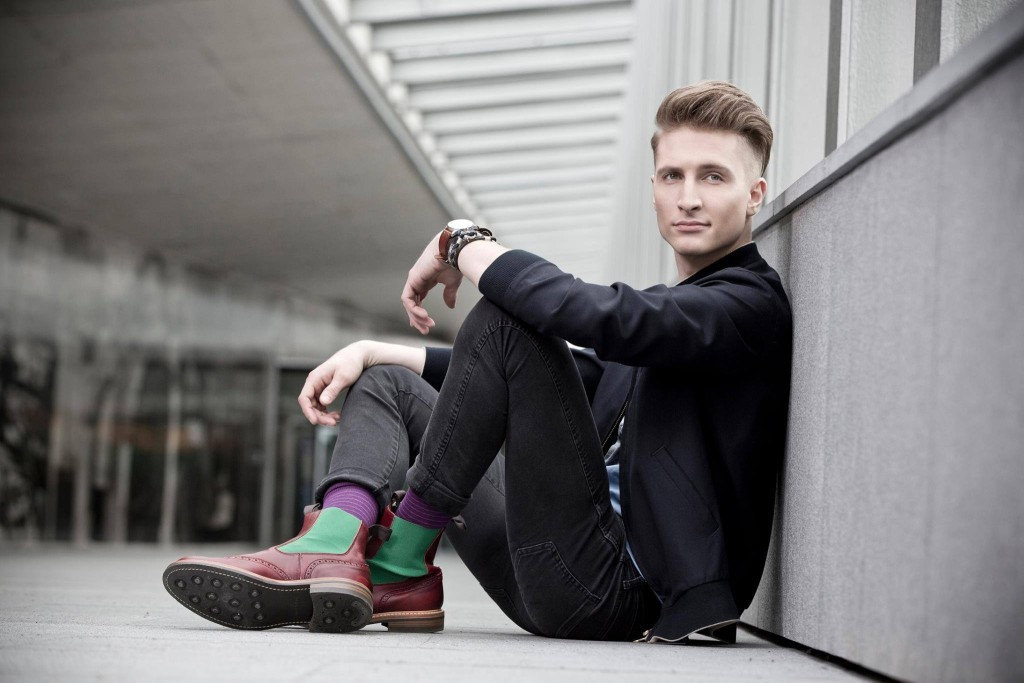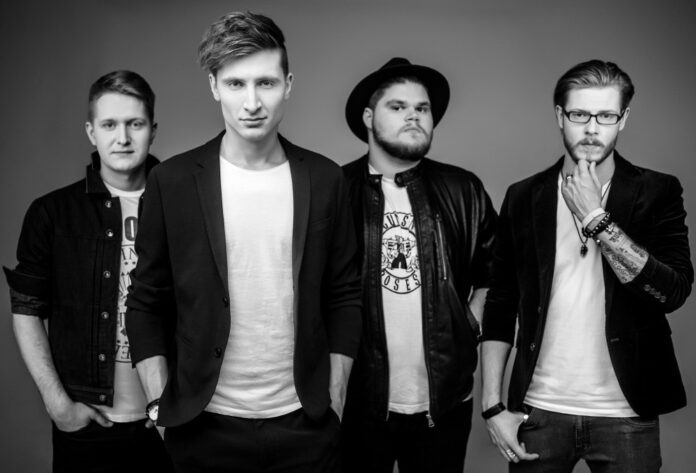How many great discoveries have been made by accident? Most likely it would be hard to count them all, especially in the area of culture. But it seems that not so long ago, Estonia became the place where another discovery of this kind happened – Karl-Erik Taukar has been the shiniest of stars on Estonia’s musical sky for the past few years, and it does not seem like he is going to give an inch. He became the biggest sensation of the 5th edition of Eesti Otsib Superstaari, eclipsing even the winner, Rasmus Rändvee. His first solo album was a remarkable success, and the second one, released lately, is following those footsteps. We managed to do an interview with him and ask a few questions about his quickly developing career, right before his CD „Kaks” reached the shelves.
Typical, normal, boring question first, to get in the mood – can you please tell the story of how music appeared in your life?
I think it started pretty early, because my mom was, and still is, a piano teacher, so our home has always been filled with music. Mom had piano students coming over and I was this little brat always playing video games and interrupting everybody (laugh) I got more into music, when I moved from Viljandi, the city I was born in, to Tallinn. I started attending new school, where they had really good musical education and I got to sing in one of Estonia’s best boys’ choirs. But even then I didn’t have much interest in solo singing. I just attended choir’s rehearsals, while really being more into track and field and basketball. In 7th grade, the class band was formed and they needed a bass player. That was the time when I started entering puberty, listening to Nirvana and Pearl Jam… I took the position of bass player and I got my first bass. We didn’t have a place to play at, so we came to the small culture house near Tõrva and we rehearsed there for the first time. It was then that I started playing bass, became a part of a band for the first time. Year after that we became a school band, but I still wasn’t singing. It all progressed until this moment now, when I’m singing solo. It wasn’t planned this way.

But why music and not basketball then?
I was really talentless in basketball, to be honest…
How come? You are THAT tall! Everybody thinks that being tall is all you need to be a successful basketball player.
I am tall, that’s true, but it turns out there are a lot of other things as well… I had the advantage of being tall, but this is just one of those games that I do not show much talent at. (laugh)
You took part in Eesti Otsib Superstaari. Do you think you would have started a solo career without entering the show?
It’s hard to tell in terms of a career. I think you can say that somebody has a music career when he or she has some recognition. Before the show, only a small amount of people recognized me, and these were the people that I played for as a part of the band. But back then I was not really serious about music. I went to the audition just to try myself out. So, I don’t really know… Maybe without the show I would have already been working as a PR specialist, because I studied PR and journalism in Tartu, but it’s really hard to tell „what would have happened if…”. Last couple of years have been pretty spontaneous for me.
That’s almost exactly the same thing that Ott Lepland told me when I asked him a similar question. Maybe it’s a common thing between all the vocalists that competed in Eesti Otsib Superstaari?
It might be! It is different comparing to Sweden, for example, where there are 50 times more musicians than in Estonia and thousands of people are trying and trying to get into the show, and here we are just like „Meh, okay, maybe I will go and see how it is”. So, I think that in Estonia you just happen to be a musician, or happen to become someone else. Or maybe I’m wrong.
So, is it easier to be a successful musician in Estonia than anywhere else?
It is easy, but there are advantages and disadvantages. As I said, it’s not that hard to stay „in the picture”, to manage and stay popular in a smaller community. But in a smaller place you have to get along with everybody, you can’t really choose where to perform, if you want to be a full-time musician. Sometimes you have to perform in places that are not really that close to your heart, and for people that don’t really dig your stuff, and do other things in order to earn a living.
You are really a top artist in Estonia right now. Isn’t it hard to be that popular in such a small country, where everyone is taking pictures of you in every possible situation, always asking for autographs? You can’t be anonymous even for a second.
I believe it would have been even harder in a bigger country. When you are very popular in Estonia, you can always go to Latvia and nobody knows you there. We had a little band camp near the Latvian border and we went to the store in Latvia… I hadn’t been abroad for quite a while and I have to say it was really relaxing, when nobody recognized me. So, it is pretty easy to get away from all of it. But all I have been doing was to get this kind of attention, so I have no reason and no right to complain about it.
Your first solo album „Vääramatu jõud” was released some time ago. Is it what you imagined it to be?
Absolutely, because actually I was the one, who was in the studio all the time, throughout the whole recording process. Both of our co-producers, who had also composed some of our songs, were abroad at the time, so me and my guitarist, Eric, produced it and played everything on it. We did it how we wanted to, and there was noone else telling us how to do all the stuff. There were no other producers, but ourselves. So, if I wasn’t pleased with it, the only person to blame would have been me. I am really happy about how the album turned out.
And what is your most favourite thing about it?
It may sound boring, but my favourite thing is an acoustic guitar solo in the track no. 2, „Unustatud mees”, played by Eric. I think that musically it is one of the most well-played things and it is something that most of the people don’t notice, but we had guitarists listening to it after it had been recorded, and they were saying that „wow, this is the best acoustic solo ever”.
After having your first solo album released, you became a host in the show no other than Eesti Otsib Superstaari. How did you switch from a contestant to the host?
Actually, I don’t know (laugh). I’m not sure what were they thinking at the TV3, handing their biggest spring project to a guy that never hosted a show before. One evening, Triin Luhats, one of the executive producers of the show, called me and said „We want to audition you”. I said „Well, you know, I already came to the audition for the show once. I had my shot.” and she said „This time we want to audition you for a host.”. A few days later I went to the office of the production company and we did a rehearsal and that’s how it happened. It was a big surprise for me, because most of the people doing the show are actors, and for me it was a big privillege.
Looking at it now, was it harder to be a host or to sing on that stage?
If I had to host the show back in 2012, it would have been too overwhelming and definitely much harder. But now, with some experience, I’d say it was more fun to host it. I wasn’t as nervous and as scared as 4 years ago, because then you had to sing well or leave. It was also fun, but pretty stressful as well. This time nobody would have kicked me out of the show, if I hosted it badly. (laugh)
I don’t think anybody would want to get rid of you! You did your job as a host so well, that you even got an award for that!
Yes, yes I did. It was a big surprise really!
Getting an award after hosting a show for the first time – that doesn’t happen often. What do you think made your way of hosting become a successful one?
I honestly don’t know. Maybe the fact that I was fresh – it was my first time and I did it the way I believed the show should be hosted. I think I was pretty honest and authentic as well. Actually, I developed really much throughout the 4 months of making the show. I went there without any predjudice and just did what felt right at the moment.
It seems that now you are extremely busy, playing concerts not only every day, but sometimes multiple times a day! Isn’t that pace of life tiring?
Physically – if I get a good sleep, I wouldn’t call it that tiring. The performance itself lasts for about an hour or hour and a half… I would say it’s mentally more stressful. You physically end a show, but mentally it doesn’t end just then. I have chosen to give out autographs and pose for the pictures with pretty much everybody that asks for it, because it’s actually a sign of respect towards me, but to be honest, deep down I don’t really love this kind of affection.
But do you already have some loyal fans that you recognize?
Yes, I do. I have actually one girl, who, I think, actually attends our concerts at least once a week, either in Tallinn or anywhere else. She takes a train to Võru or Valga and that’s just great. She also attends Ott Lepland’s concerts. Her name is Merike and she is a greatgreat person. It’s always good to see her.
You are a role model for some of your fans, especially younger ones. How do you feel with that kind of responsibility?
I quit smoking (laugh), so I don’t have to smoke in front of kids anymore. Sometimes, when there is no other place to go, people would see you with a cigarette and it always feels a bit wrong. I always felt bad smoking in front of kids, because they may think „Okay, he smokes, so maybe it’s cool”. I quit, so this problem is no more. I try not to have vices (at least any visible ones) and I don’t expose those I already have. I do my best to be a good role model.
Coming back to the subject of your album – what do you think makes it stand out from the crowd? Estonian market is full of pop music nowadays, and yet it was your CD that got awarded with two Estonian Music Awards.
It did get two awards, yes, and I was really happy because of that. But I think it simply sounds really good. We seriously put ourselves into it. In Estonia, a major part of pop music is not played with real instruments; there is a tendency to program everything. We actually played everything, we never used sample drums or anything like this, we just did it naturally… And I think that’s it. And I think these are the reasons why people should, could or would like to listen to our album. We recorded it in the way to make it sound as similar as possible to how we sound like live. I always say „we”, because I really love playing with my band. And we have some really good pop tunes as well!
You tried your luck also in Eesti Laul. Everyone predicted you to be a winner and then, to everybody’s biggest surprise, somehow you didn’t make it to the final…
I think it was the betting operators that announced us the front-runners really. However, it turned out to be a really strong final after all, so we weren’t that sad about it, maybe only that evening. We actually tried the year before as well, with our song „Vastupandamatu”, but it didn’t even make the TOP 20! So, comparing those 2 years, we made a great progress. This time we made it to TOP 20, who knows what can happen next?
I can’t wait to find out. But do you think that Eurovision is still the best place for an Estonian band to go and gain bigger recognition?
Maybe for Estonian solo singers, but in my opinion Eurovision is not the best place for bands. It is so focused on pop music and choreography and things like this, that I don’t think a real rock band or a good live playing band would make it there. Unless, besides being a good band, they are also good visual performers that know who they are performing for, because it has shown that Eurovision viewers and voters really like good old strong pop. We had Ruffus representing us there in 2003 and they didn’t do so well, although their song was really amazing. So, yeah, I think for Estonian solo singers, Eurovision is the nearest and biggest place to show themselves to a bigger audience.
And don’t you want to show your music to a bigger audience abroad?
Not right now. We are focusing on Estonian listeners and Estonian music market at the moment. Maybe in a couple of years… We have some demos recorded with Eric, but it’s not something we want to come out with in like a year or two. Right now we are trying to conquer Estonia!
What is your view on Estonian music nowadays?
I think we are really gaining confidence and sound, and we are doing it fast. The reason why in the last 20 years we have made such a big leap towards the hope of having a big A-list band coming from Estonia is the fact, that for over 50 years we were held inside a metal box of occupation. And yet, even then we had big music stars coming from Estonia, but they basically only played in Russia. I think we are really developing fast and all signs are showing that a big breakthrough from an Estonian act can come soon.
Pictures: Star.ee agency.







